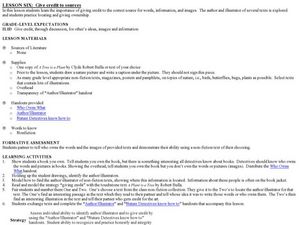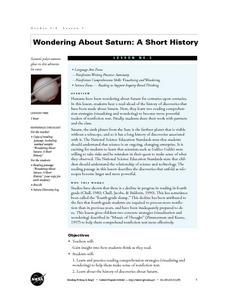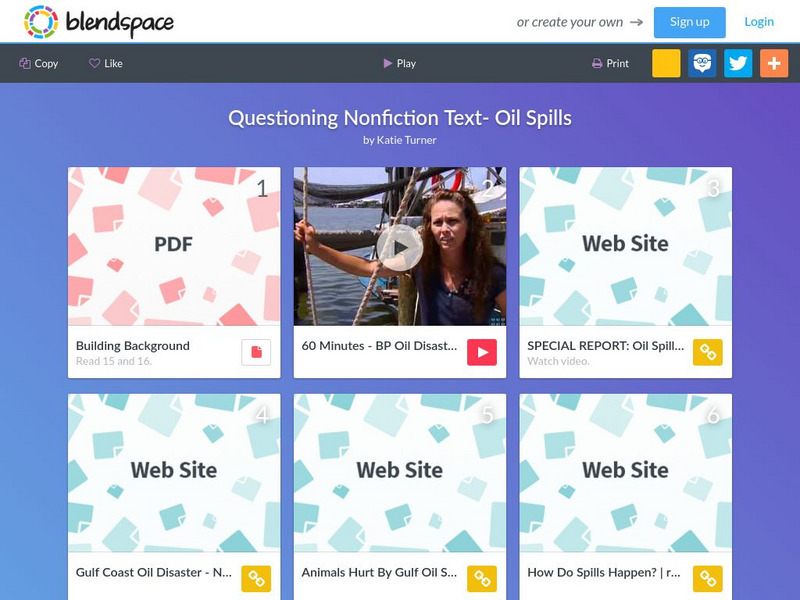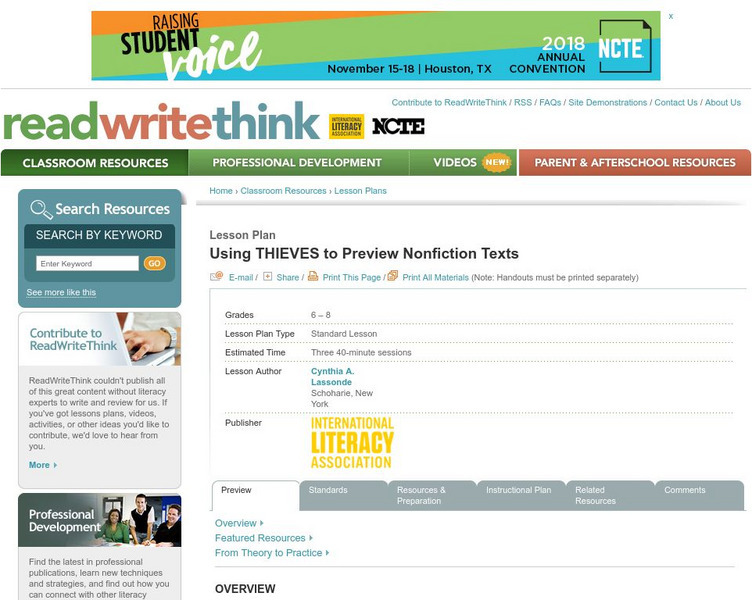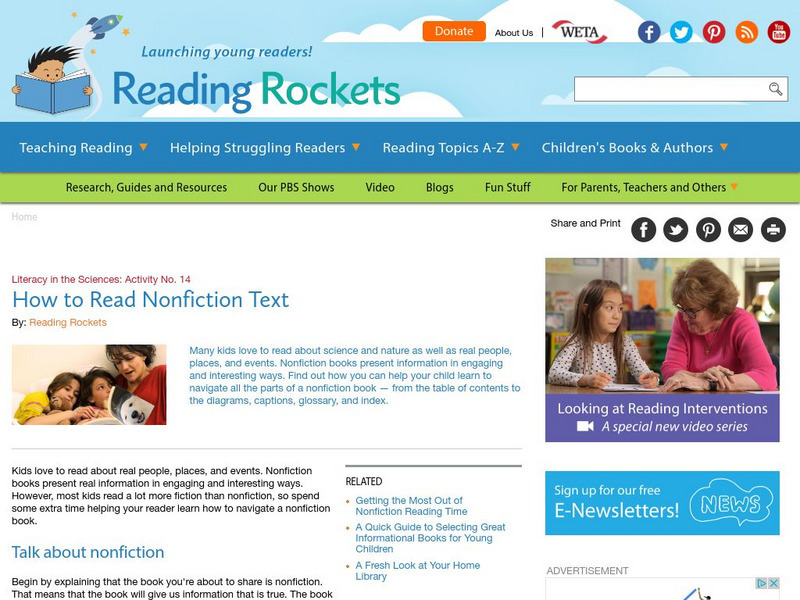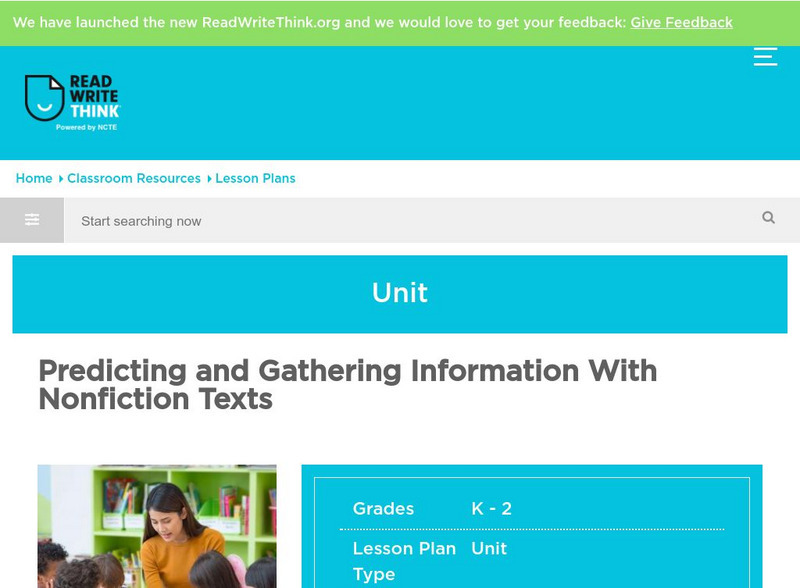Curated OER
Give Credit to Sources
Third graders practice referencing material. For this giving credit to sources lesson, 3rd graders explore ownership of words and images by drawing and labeling a picture then problem solving how to identify the author.
Curated OER
Wondering About Saturn: A Short History
Students read an article about the history of Saturn. They complete reading comprehension tests. They examine what has been discovered on the planet.
Curated OER
Gray Whales: Hitchhikers: Free Rides on Gray Whales
Students read about Gray Whales and circle any unfamiliar terms.
Curated OER
Voices at Whisper Bend
Students examine life in Pennsylvania during and after World War II. Using primary source documents, they compare the unity of the United States during World War II and the Iraq War. They also discover how citizens adapt to the war at home.
Curated OER
Underground Travelers
Students are introduced to new vocabulary associated with the Underground Railroad. Using primary sources, they evaluate the railroad's impact on society in the past and today. They also make a judgment about the morality of the railroad...
Curated OER
Researching Stocks on New York Stock Exchange
Sixth graders research to find background information and stock history over the last year about a company listed on the NYSE. They evaluate whether or not they should "invest" in that company. They write a persuasive essay outlining...
Curated OER
Severe Weather Planning
Fourth graders research the need to prepared for a severe weather event. They select one type of weather condition and explain how to be prepared in a report.
Curated OER
Weather Records
Students write newspaper articles based on weather records set around the world. Students read and discuss weather records and their results, then write a newspaper article about how the weather records have affected people around the...
Curated OER
Comparing Weather Conditions
Students conduct research on temperature, wind speed and weather conditions from a variety of areas. They organize their findings on worksheets and spreadsheets and discuss various examples of databases.
Curated OER
Hurricane Scavenger Hunt
Fourth graders use Internet and/or library resources to locate and record information about hurricanes on a worksheet..
Curated OER
Identifying and Categorizing Worthy Attributes
Students write research questions. In this worthy attributes lesson, students discuss famous persons and what sets them apart from others. Students identify questions to guide prior to researching a famous person.
British Library
British Library: 19th Century Non Fiction Texts: Work & Welfare
This thematic collection will allow students to read and understand 19th-century non-fiction texts, and support them in identifying key features for a range of genres, audiences, and purposes. Each source is accompanied by original...
British Library
British Library: 19th Century Non Fiction Texts: Gender, Behaviour & Etiquette
This thematic collection will allow learners to read and understand 19th-century non-fiction texts, and support them in identifying key features for a range of genres, audiences, and purposes. Each source is accompanied by original...
British Library
British Library: 19th Century Non Fiction Texts: Education
This thematic collection will allow students to read and understand 19th-century non-fiction texts, and support them in identifying key features for a range of genres, audiences, and purposes. Each source is accompanied by original...
British Library
British Library: 19th Century Non Fiction Texts: Crime & Punishment
This thematic collection will allow students to read and understand 19th-century non-fiction texts, and support them in identifying key features for a range of genres, audiences, and purposes. Each source is accompanied by original...
Austin Independent School District
Austin Independent School District: Summary of Fiction and Nonfiction Text [Pdf]
This 31-page document focuses on teaching summarizing strategies for use with fiction and nonfiction texts. This series of lesson plans starts with fiction summarizing strategies such as "Somebody-Wanted-But-So-Then" and "Story Arch."...
ReadWriteThink
Read Write Think: Reading/writing About Whales Using Fiction and Nonfiction Texts
Students will have a whale of a good time in this lesson in which they use fiction and nonfiction texts to write a letter to an online scientist.
ReadWriteThink
Read Write Think: Comprehending Nonfiction Text on the Web
Contains plans for three lessons designed to improve comprehension of nonfiction, especially nonfiction texts on the web. It focuses on identifying text features, locating specific information, and generalizing that information. In...
TES Global
Blendspace: Questioning Nonfiction Text Oil Spills
An eight-part learning module with links to texts, videos, and websites to use while improving informational text skills through the topic of oil spills. The print materials have directed exercises for text analysis by students.
ReadWriteThink
Read Write Think: Animal Study From Fiction to Facts
Contains plans for five 50-minute lessons that ask students to compare and research information about animals from fiction and nonfiction texts. In addition to student objectives and standards, these instructional plans contains links to...
ReadWriteThink
Read Write Think: Using Thieves to Preview Nonfiction Texts
Contains plans for three lessons that introduce a nonfiction prereading strategy with the acronym THIEVES, which stands for Title, Headings, Introduction, Every first sentence, Visuals and vocabulary, End Questions, and Summary. In...
Polk Brothers Foundation Center for Urban Education at DePaul University
De Paul University: Center for Urban Education: How Does Writer Organize Nonfiction Text?[pdf]
This poster contains writing craft questions for students to ask when reading nonfiction. This graphic organizer is a copyrighted material that may be used for educational purposes.
Reading Rockets
Reading Rockets: How to Read Nonfiction Text
Kids love to read about real people, places, and events. Nonfiction books present real information in engaging and interesting ways. However, most kids read a lot more fiction than nonfiction, so spend some extra time helping your reader...
ReadWriteThink
Read Write Think: Predicting and Gathering Information With Nonfiction Texts
Contains plans for eight short lessons that introduce nonfiction texts to second grade students. In addition to objectives and standards, this instructional plan contains links to sites used in the lessons as well as assessment and...
Other popular searches
- Nonfiction Text Features
- Nonfiction Text Structures
- Types of Nonfiction Text
- Features of Nonfiction Text
- Fiction and Nonfiction Text
- Nonfiction Text Elements
- Infer Nonfiction Text
- Parts of Nonfiction Text
- Summarizing Nonfiction Texts
- 6 Nonfiction Text Structure
- Inquiry and Nonfiction Text
- Reading Nonfiction Text


